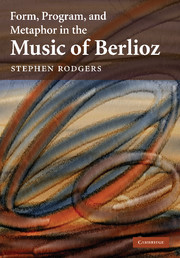Book contents
- Frontmatter
- Contents
- Music examples
- Figures
- Acknowledgments
- 1 Introduction
- 2 Preliminary examples and recent theories
- 3 Form as metaphor
- 4 Mixing genres, mixing forms: sonata and song in Le Carnaval romain
- 5 The vague des passions, monomania, and the first movement of the Symphonie fantastique
- 6 Love's emergence and fulfillment: the Scène d'amour from Roméo et Juliette
- 7 Epilogue
- Notes
- Bibliography
- Index
3 - Form as metaphor
Published online by Cambridge University Press: 27 June 2009
- Frontmatter
- Contents
- Music examples
- Figures
- Acknowledgments
- 1 Introduction
- 2 Preliminary examples and recent theories
- 3 Form as metaphor
- 4 Mixing genres, mixing forms: sonata and song in Le Carnaval romain
- 5 The vague des passions, monomania, and the first movement of the Symphonie fantastique
- 6 Love's emergence and fulfillment: the Scène d'amour from Roméo et Juliette
- 7 Epilogue
- Notes
- Bibliography
- Index
Summary
The age-old program problem
In his 1971 Norton Critical Score of the Symphonie fantastique Edward T. Cone writes, “The relationship between the program and the music of the Fantastic Symphony has been the source of as much discussion and controversy as the music itself.” He goes on to characterize the ways scholars have conceived of that relationship. On one side, he tells us, is someone like Jacques Barzun, who concludes that the program can be “relegated … to the role of promotional aid”; on the other is Hugh Macdonald, who writes that “it is a fashionable analytical folly that urges us to consider the work as ‘pure music.’ ” Nine years later Barzun himself revisits the question in his article “The Meaning of Meaning in Music: Berlioz Once More.” He describes the state of affairs similarly, with those who believe Berlioz's music is “about something” and so cling tenaciously to its programs on one extreme and those who prefer to regard it as “pure music” untied to feelings and ideas on the other. By 1995, little, it seems, has changed, when Jean-Pierre Bartoli has this to say about the contentious issue of the Symphonie fantastique and its program: “for some, it is tempting to justify the work according to its program since, as its author puts it, it ‘motivates the character and the expression’ of the work.
- Type
- Chapter
- Information
- Form, Program, and Metaphor in the Music of Berlioz , pp. 39 - 62Publisher: Cambridge University PressPrint publication year: 2009



